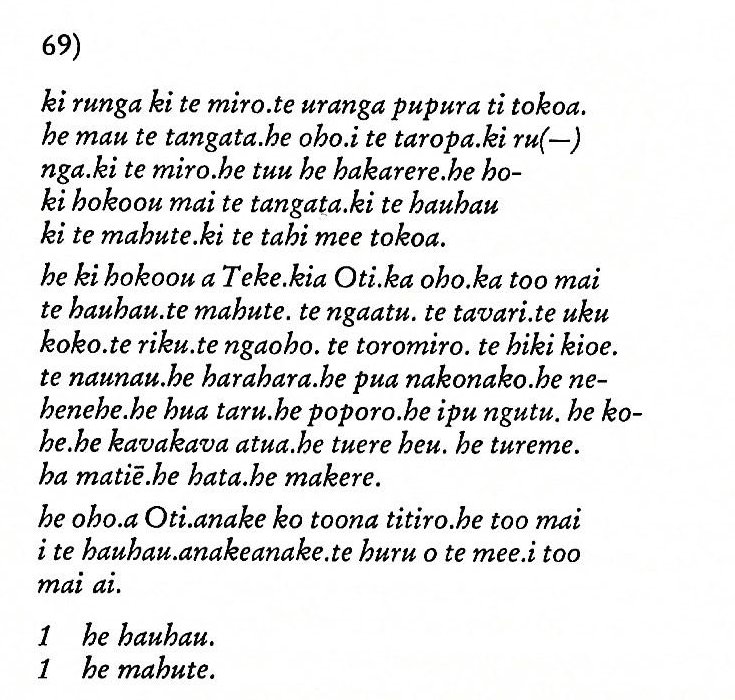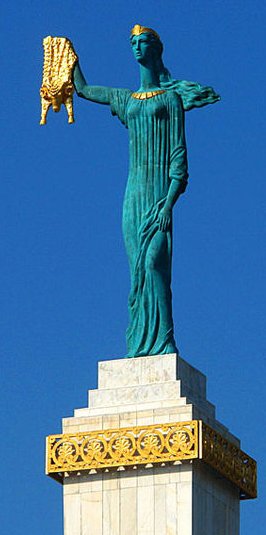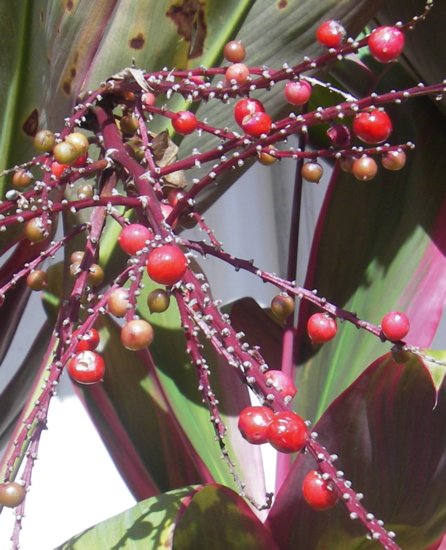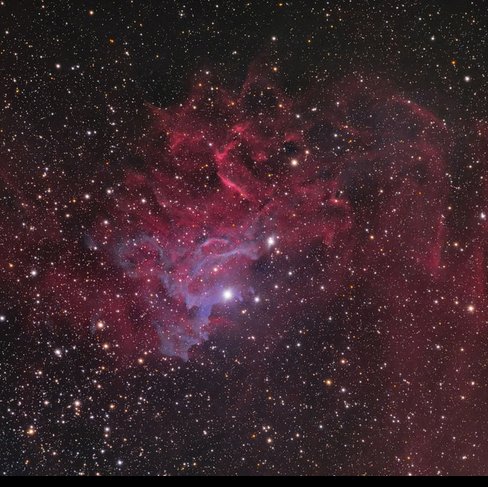
|
E:67 |
|
he ki a Teke.kia Oti.ka
unga te tangata |
Teke said
to Oti, 'Send the men [ka unga te tangata]
for banana shoots. They shall take all kinds of
banana shoots [anakeanake.te huru o te maika]
from my banana plantation, also taro, all kinds of
taro, furthermore ti (Cordyline fruticosa)
and kape (Alocasia macrorrhiza).' |
|
ki te
huri.maika ka too mai i
roto i taak(u) |
|
maika ena.anakeanake.te
huru o te maika ana |
|
too mai.te taro
tokoa.anakeanake te huru. o te |
|
taro.ana too mai.he ti
tokoa.he kape tokoa. |
| Huri.
1. To turn (vt.), to overthrow, to
knock down: huri moai, the overthrowing of
the statues from their ahus during the period
of decadence on the island. 2. To pour a
liquid from a container: ka huri mai te vai,
pour me some water. 3. To end a lament, a
mourning: he huri i te tagi, ina ekó tagi hakaou,
with this the mourning (for the deceased) is over,
there shall be no more crying. 4. New shoot
of banana: huri maîka. Vanaga. 1. Stem. P
Mgv.: huri, a banana shoot. Mq.: hui,
shoot, scion. 2. To turn over, to be turned over
onto another side, to bend, to lean, to warp;
huri ke, to change, to decant; tae huri ke,
invariable; huri ke tahaga no mai, to change
as the wind; tae huri, immovable; e ko
huri ke, infallible; huhuri, rolling;
hakahuri, to turn over; hakahuri ke, to
divine. P Pau.: huri, to turn. Mgv.: huri,
uri, to turn on one side, to roll, to turn
upside down, to reverse. Mq.: hui, to turn,
to reverse. 3. To throw, to shoot. 4. To water, to
wet. 5. To hollow out. Hurihuri: 1. Wrath,
anger; kokoma hurihuri, animosity, spite,
wrath, fury, hate, enmity, irritable, quick
tempered, to feel offended, to resent, to pester;
kokoma hurihuri ke, to be in a rage. 2. (huri
4) hurihuri titi, to fill up. 3. To polish.
4. (uriuri). Hurikea, to transfigure,
to transform. Churchill. Mq. huri,
resemblance. Sa.: foliga, to resemble.
Churchill.
Huru. Custom, tradition,
behaviour, manners, situation,
circumstances; poki huru hare, child who
stays inside (to keep a fair complexion); te huru
o te tagata rivariva, a fine person's behaviour;
pehé te huru o Hiva? what is the situation on
the mainland? Huruhuru, plumage,
feathers (the short feathers, not the tail
feathers), fleece of sheep. Vanaga. Samoa:
sulu, a torch; to light by a torch; sulusulu,
to carry a torch; susulu, to shine (used of
the heavenly bodies and of fire). Futuna: susulu,
the brightness of the moon. Tonga: huluaki,
huluia, huluhulu, to light, to
enlighten; fakahuhulu, to shine; iuhulu,
a torch or flambeau, to light with a torch. Niuē:
hulu, a
torch; huhulu,
to shine (as the moon). Maori: huru,
the glow of the sun before rising, the glow of fire.
Churchill 2.
 |
|
he oho.a Oti.anake ko
toona titiro he tuu |
Oti and all
his assistants went away, arrived, and took some of
the banana shoots as well as taro, ti, and kape. |
|
he too mai i te huri
maika.i te taro tokoa |
|
i te tī tokoa.i te kape
tokoa. |
|
E:68 |
|
erima te rau te taropa o te huri maika. |
(There
were) five hundred baskets of banana shoots, a
thousand baskets of taro, fifty bundles of long ti
roots, and ten baskets of little kape seedlings.
[500 + 1000 + 50 + 10 = 26 * 60.] They tied up the baskets carefully, and Oti said
to his assistants, 'Take all the baskets [ka mau
tahi te taropa] |
|
huri mata.
etahi te piere.te
taropa |
|
o te taro.erima
te kauatu.te (u)ranga. |
|
o te pupura
tī.et(a)hi
te kauatu te ta(-) |
|
ropa o te mamari
kape.he here tahi
ngu(-) |
|
tu.o te taropa
anakeanake. he ki a Oti ki |
|
toona titiro.ka mau
tahi te taropa. |
|
Ti by lying with Tattooing
made the ti plant (he ti ki ai ki roto ki
a he ta ka pu te ti). Burnt ti leaves
were used to produce the black dye for tattooing.

Kape. 'Bitter-taro' (Alocasia
macrorrhiza). In 1957 kape was still
cultivated in much the same way as dry taro. It is a
type of food to be eaten during times of famine.
According to Fuentes (1960:856), the tubers had to
be kept in the earth-oven for 15 (sic) days
in order to eliminate some of the poisonous
components. Barthel 2. Arum, yam. Churchill.
Bitterness by doing it with Bad-taste produced the
kape (mangeongeo ki ai ki roto he rakerake
ka pu te kape). |
|
E:69 |
| ki runga
ki te miro.te uranga
pupura ti tokoa. |
on board the canoe [ki runga ki te miro], as
well as [tokoa] the hundreds of [?] ti
roots!' The men picked up the baskets and brought
them on board the canoe.
They arrived and left them there [he tuu he
hakarere].
Then the men came back for the hauhau tree, the
paper mulberry tree, and for all other things (i.e.,
plants) [ki te tahi mee tokoa]. |
| he mau
te tangata.he oho.i te taropa.ki ru(-) |
| nga ki
te miro.he tuu he hakarere.he ho(-) |
| ki
hokoou mai te tangata.ki te hauhau |
| ki te
mahute.ki te tahi mee tokoa. |
|

... It produces 40-60 cm long
panicles of small scented yellowish to red flowers
that mature into red berries ...
Ura, lobster. Ûra, flame, blaze (ûra
ahi), to become furious (with manava as
subject: ku-ûra-á te manava). Úraúra,
bright red. Vanaga. 1. Crayfish, lobster, prawn. P
Mgv.: ura, crayfish. Mq.: uá, lobster.
Ta.: oura, crayfish, lobster. 2. Fire,
burning, to be in flames; uraga, combustion,
flame, torch; hakaura, to cause to glow, to
kindle, to light. P Mgv., Ta.: ura, a flame,
to burn. Mq: uá, id. Uraga, burden,
load, weight. Uraura, vermilion, scarlet. P
Pau.: kurakura, red. Mgv.: uraura, an
inflamed countenance. Mq.: uáuá, red, ruddy.
Ta.: uraura, red. Churchill.

(IC405, the Flaming Star, which rose at the same
time as Rigel and Capella.)
Pura.
To turn white; glow, brilliance; he-pura te mata,
the eyes twinkle (said of someone who looks at
something with great interest). Purapura,
descendent; koau he purapura o Miru, I am a
descendent of the Miru tribe. Pupura, the
part of the sugarcane or of the ti plant
which is cut off and planted again: pupura tôa,
pupura ti. Vanaga.
Hetu 1. To (make) sound;
figuratively:
famous, renowned. 2. To crumble into embers (of a
bonfire). Hetu'u. Star, planet;
hetu'u popohaga
morning star; hetu'u ahiahi evening star; hetu'u viri
meteorite. Vanaga. Hetu 1. Star (heetuu);
hetu rere, meteor;
hetu pupura, planet. P Pau.: hetu,
star. Mgv.: etu, id. Mq.: fetu,
hetu, id. Ta.: fetu, fetia, id.
The alternative form fetia in Tahiti, now the
only one in common use, need not be regarded as an
anomaly in mutation. It seems to derive from Paumotu
fetika, a planet. Its introduction into
Tahiti is due to the fashion of accepting Paumotu
vocables which arose when the house of Pomare
came into power. 2. Capital letter (? he tu).
3. To amuse. 4. To stamp the feet. Hetuhetu,
to calk, to strike the water. Hetuke, sea
urchin. Churchill.
Maea. Stone, rock. Vanaga. Stone, rock;
maea kore, free of stones; maea horohoro,
snowy rock; maea mataa, obsidian used
for spear heads T; maea matariki, stone used
for the images T; maea
pupura, hard cellular stones used in the
platforms T; maea puruhare, tile; maea
regorego, a flinty beach pebble used for the
finest stone implements T; maea toki, hard
slates, black, red and gray, used for axes T;
maea viriviri, grindstone. Churchill.
Mata. 1. Tribe, people; te mata
tûai-era-á, the ancient tribes. 2. Eye; mata
ite, eyewitness. 3. Mesh: mata kupega. 4.
Raw, uncooked, unripe, green, matamata,
half-cooked, half-ripe. Kahi matamata, a tuna
fish. Vanaga. 1. The eye; mata neranera,
mata kevakeva, mata mamae, to be drowsy;
mata keva, mataraparapa, matapo,
blind; mata hakahira, squint eyed; mata
pagaha, eye strain. 2. Face, expression, aspect,
figure, mien, presence, visage, view; mata mine,
mata hakataha, mata
pupura, mata hakahiro, to
consider. 3. Raw, green, unripe. 4. Drop of water.
5. Mesh; hakamata, to make a net. 6. Cutting,
flint. 7. Point, spear, spike (a fish bone). 8.
Chancre. Matamata, sound of water. Churchill.
There is a wide range of significations in this
stem. It will serve to express an opening as small
as the mesh of a net or as large as a door of a
house; it will serve to designate globular objects
as large as the eye or as small as the bud on a twig
or the drop of rain, and designating a pointed
object it answers with equal facility for the
sharpened tip of a lance or the acres of a headland;
it describes as well the edge of a paddle or the
source from which a thing originates. Churchill 2.
Matá. Black obsidian spear points, all
belonging to the Late Period which began ca 1680.
Heyerdahl 3. |
| he ki
hokoou a Teke.kia Oti.ka oho.ka too mai |
Teke said to Oti, 'Go and take the hauhau tree, the
paper mulberry tree, rushes, tavari plants, uku koko
grass, riku ferns, ngaoho plants, the toromiro tree,
hiki kioe plants (Cyperus vegetus), the
sandalwood tree, harahara plants, pua nakonako
plants, nehenehe ferns, hua taru grass, poporo
plants, bottle gourds (ipu ngutu), kohe
plants, kavakava atua ferns, fragrant tuere heu
grass, tureme grass (Dichelachne sciurea),
matie grass, and the two kinds of cockroaches
makere and hata.' |
| te
hauhau.te mahute. te ngaatu. te tavari.te uku |
| koko.te
riku.te ngaoho. te toromiro. te hiki kioe. |
| te
naunau.he harahara.he pua nakonako.he ne- |
|
henehe.he hua taru.he poporo.he ipu ngutu. he ko- |
| he.he
kavakava atua.he tuere heu. he tureme. |
| ha matiē.he
hata.he makere. |
| he oho.a
Oti.anake ko toona titiro.he too mai |
Oti and all his assistants went and took the hauhau
tree with them. All kinds of things [te huru o te
mee] (i.e., plants) and insects [?] were taken
along. |
| i te
hauhau.anakeanake.te huru o te mee.i too |
| mai ai. |
|
1 |
he hauhau. |
|
1 |
he mahute. |
|
|